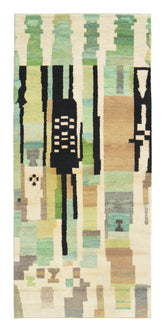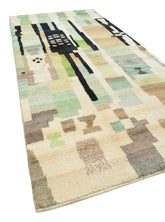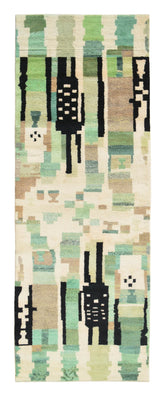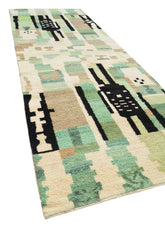How Handmade Rugs Empower Moroccan Women Artisans

Handmade rugs have long been an essential part of Moroccan culture, symbolizing both artistic expression and deep-rooted tradition. Behind every intricately woven Moroccan rug lies the skill and dedication of artisans, many of whom are women. These women, often the backbone of their communities, weave not only rugs but also stories of empowerment and resilience. This blog post delves into the lives of these artisans, highlighting the transformative impact of fair trade and ethical working environments on their communities.
The Tradition of Rug Weaving in Morocco
Moroccan rug weaving dates back centuries, with techniques passed down through generations. Historically, women in rural communities have played a pivotal role in preserving this craft. Each rug is more than just a floor covering; it is a piece of cultural heritage, reflecting the weaver's experiences, environment, and identity. The motifs and patterns are often symbolic, representing protection, fertility, and natural elements.
In a society where opportunities for women were traditionally limited, rug weaving became a form of creative expression and economic participation. Today, Moroccan rugs are admired worldwide for their beauty and craftsmanship, and women artisans continue to be at the heart of this tradition.
Illuminate Collective's Commitment to Empowering Artisans
Illuminate Collective, a brand known for its stunning handmade rugs, is deeply committed to empowering Moroccan women artisans. Through fair trade practices, they ensure that artisans receive fair wages and work in safe, ethical environments. This approach not only supports the artisans financially but also respects their cultural heritage and craftsmanship.
Illuminate Collective's mission goes beyond creating beautiful rugs. By partnering directly with artisans, they foster sustainable relationships that uplift entire communities. This ethical model empowers women, enabling them to provide for their families, gain financial independence, and preserve their traditional craft.
The Lives of Moroccan Women Artisans
Behind every handcrafted rug is a story of dedication and resilience. Moroccan women artisans often come from rural areas where opportunities for education and employment are limited. For many, weaving rugs is not only a means of income but also a way to preserve their cultural identity. These women balance their responsibilities as mothers, wives, and community members while honing their craft, often working long hours to create intricate designs that are admired worldwide.
The income generated from rug weaving provides these women with financial independence, allowing them to contribute to household expenses, support their children's education, and improve their living conditions. Beyond the economic impact, rug weaving also fosters a sense of pride and accomplishment, as artisans see their work appreciated and valued on a global scale.
The Economic Impact of Fair Trade on Artisans' Communities
Fair trade practices are crucial in ensuring that Moroccan women artisans receive fair compensation for their labor. Unlike traditional markets where middlemen often exploit artisans, fair trade initiatives prioritize direct partnerships between artisans and buyers. This ensures that a significant portion of the profits goes directly to the artisans, providing them with a stable income.
The economic benefits of fair trade extend beyond individual artisans. As women earn fair wages, they reinvest in their communities, supporting local businesses and services. This ripple effect can lead to improved infrastructure, better access to education and healthcare, and overall community development. By choosing fair trade rugs, consumers contribute to this positive cycle of growth and empowerment.
Artisan Profiles: Real Stories of Empowerment
One of the most inspiring aspects of working with Moroccan women artisans is hearing their personal stories of empowerment. Take, for example, Amina, a skilled weaver from the Atlas Mountains. Through her work with Illuminate Collective, Amina has been able to provide for her three children, ensuring they have access to education and healthcare. Her rugs, crafted with meticulous attention to detail, have found homes across the globe, and with each sale, she gains more confidence in her abilities.
Another artisan, Fatima, shares how rug weaving has transformed her life. In a male-dominated society, earning her own income has given her a newfound sense of independence. She no longer relies solely on her husband's income and has become a respected figure in her village, mentoring younger women who wish to learn the craft.
These stories are just a glimpse into the lives of the women who bring Moroccan rugs to life. Their resilience and determination are woven into every piece, making each rug a testament to their strength and creativity.
The Importance of Preserving Traditional Craftsmanship
As the world becomes increasingly digital, the value of traditional craftsmanship cannot be overstated. Handmade Moroccan rugs represent more than just decorative pieces; they are cultural artifacts that embody the history, beliefs, and stories of the artisans who create them. Supporting Moroccan women artisans ensures that these age-old techniques are not lost to time but are passed down to future generations.
Illuminate Collective recognizes the importance of preserving this heritage. By working closely with artisans, they help maintain the integrity of traditional weaving methods while adapting designs to meet modern tastes. This balance allows the craft to evolve without sacrificing its cultural significance, ensuring that Moroccan rug weaving remains a vibrant and respected art form.
How Ethical Working Environments Transform Communities
Creating ethical working environments is essential for the well-being of Moroccan women artisans and their communities. Illuminate Collective ensures that artisans work in safe conditions, free from exploitation and harmful practices. This commitment to ethical standards not only protects the artisans' health but also fosters a positive work environment where creativity and innovation can thrive.
When artisans are treated with respect and provided with the resources they need, the benefits extend beyond the individual. Families and communities flourish as a result of fair wages, access to healthcare, and opportunities for education. Ethical working environments also help break the cycle of poverty, empowering artisans to invest in their futures and the futures of their children.
The Role of Handmade Rugs in Modern Interiors
Handmade Moroccan rugs have become a sought-after addition to modern interiors, prized for their unique designs and cultural significance. These rugs add warmth, texture, and a sense of history to any space, making them versatile pieces that can complement various design styles, from minimalist to bohemian.
Beyond their aesthetic appeal, choosing handmade rugs reflects a commitment to ethical consumerism. As more people prioritize sustainability and fair trade, handmade rugs offer a way to make a positive impact while enhancing the beauty of their homes. Each rug tells a story, connecting the buyer to the artisan who crafted it, creating a meaningful connection between cultures.
Why Choose Handmade Moroccan Rugs?
When you choose a handmade Moroccan rug, you’re not just purchasing a beautiful piece of decor—you’re supporting a centuries-old tradition and empowering the women who create them. Each rug is unique, showcasing the artisan’s skill, creativity, and personal story. Unlike mass-produced items, handmade rugs carry a sense of authenticity and connection to their cultural roots.
Handmade Moroccan rugs also offer unparalleled quality. The natural materials and meticulous craftsmanship ensure that each rug is durable and long-lasting, making it a wise investment for your home. Additionally, by opting for fair trade products, you contribute to a more ethical and sustainable global market, supporting artisans who are treated with fairness and respect.
Supporting Fair Trade and Ethical Shopping
If you’re looking to make a positive impact with your purchases, consider exploring Illuminate Collective's Commitment to Fair Trade. Their dedication to fair trade ensures that each rug is not only a beautiful addition to your home but also a product of ethical practices that uplift Moroccan women artisans.
Sustainability and Environmental Impact
Handmade Moroccan rugs are also a sustainable choice for your home. The natural fibers used in these rugs, such as wool and cotton, are eco-friendly and biodegradable. Moreover, the traditional methods of dyeing and weaving are less harmful to the environment compared to industrial processes. By choosing handmade rugs, you’re reducing your carbon footprint and supporting a more sustainable way of living.
Illuminate Collective’s commitment to sustainability extends to their fair trade practices, which promote responsible sourcing of materials and minimize waste. This approach not only benefits the environment but also ensures that artisans can continue their craft in harmony with nature.
Learn More About Moroccan Rugs

To explore more about these beautiful and ethically sourced products, visit Illuminate Collective's Handmade Rugs. Discover the stories behind each rug and find the perfect piece for your home, knowing that your purchase supports Moroccan women artisans and their communities.
How You Can Support Moroccan Women Artisans
Supporting Moroccan women artisans is easier than you might think. By choosing to purchase handmade, fair trade rugs, you directly contribute to the empowerment of these talented women. Additionally, sharing their stories and spreading awareness about the importance of fair trade can help create a more ethical and equitable marketplace.
Every purchase you make has the power to make a difference. By choosing ethical products, you not only enrich your home with unique, high-quality items but also play a role in preserving cultural traditions and improving the lives of artisans around the world.
Conclusion
Handmade rugs are more than just decor—they are a testament to the skill, dedication, and resilience of Moroccan women artisans. Through fair trade and ethical working environments, these women are empowered to improve their lives, support their families, and preserve their cultural heritage. By choosing handmade Moroccan rugs, you’re not only enhancing your home’s aesthetic but also contributing to a positive global impact.
The next time you’re in the market for a rug, consider the stories behind the threads. Choose a piece that not only complements your space but also supports the hands that crafted it. Illuminate Collective's dedication to fair trade and sustainability makes them a perfect choice for those who value both beauty and ethical practices.





